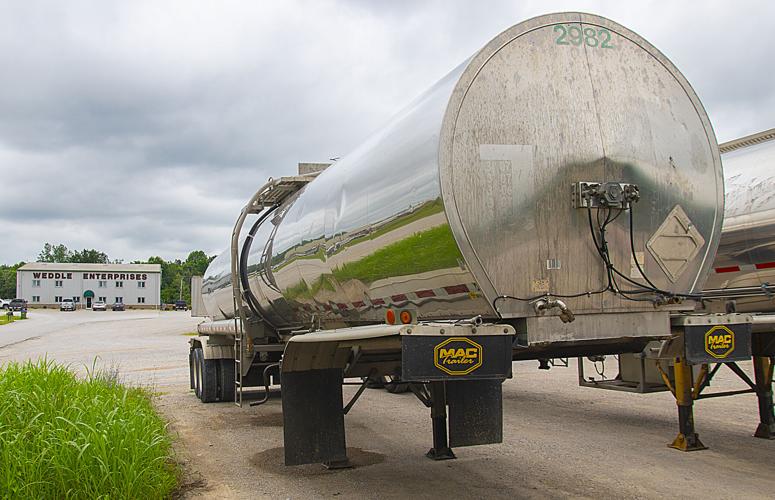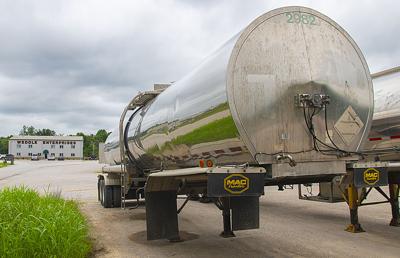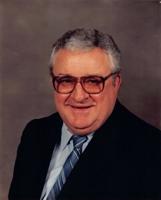On Wednesday, July 26, the leachate hauling contract between the WATCO Trucking and the city of Somerset will have officially ended. After that date, the leachate from Tri-K Landfill or Laurel Ridge Landfill will no longer be transported to Somerset and will be rerouted elsewhere.
And while some of the leachate opponents might celebrate the canceled contract as a victory, some state leaders now see Somerset’s refusal to treat leachate in their water treatment facility as a growing concern. The fear is that other cities in Kentucky may decide to follow suit, which would lead to catastrophic landfill consequences.
Deputy Commissioner of Environmental Protection Tony Hatton, who had originally planned to speak at the Somerset City Council meeting during some of their heated leachate discussions, did speak specifically about Somerset’s denial to process landfill leachate at Thursday’s Interim Joint Committee on Natural Resources and Energy in Frankfort.
“Industrial discharges into publicly owned treatment works is a long-term common practice,” Hatton stated to the statewide committee in Frankfort. “We have 26 municipal landfills in the Commonwealth of Kentucky, and 25 of those manage their leachate through discharges to publicly owned treatment works.”
“If a [city] decides not to take it [leachate], and they may have reasons for doing that, I’m not sure that we have really any influence or authority over that decision being made,” Hatton explained to the committee. “So with regards to a local decision that was made [in Somerset], it might have been based on concerns that might not be the risk that’s actually there might not support that. But different people see things differently and have different levels of concern and there’s always that challenge of over or under reacting to anything.”
In that same Interim Joint Committee on Natural Resources and Energy in Frankfort, the committee chairman instructed Hatton to convey their concerns to the leaders of Somerset that their decision could possibly start a ‘domino effect’ with other municipalities following suit. If that happens, they are concerned about the disastrous backlog of both leachate and sludge throughout the state of Kentucky that will have nowhere to go to be treated.
Most residents of Somerset had probably never heard of the word ‘leachate’ before last year, but WATCO owner Shane Weddle has been well aware all the regulations and the guidelines of leachate since the term came about in the early 1990’s. For 20 years, Weddle built the landfill cells associated with leachate collection.
“We built the holes and we put the leachate collection systems in for 20 years,” Weddle stated. “Back in 1999, Martin Allen and I started a company called WATCO, which started out by hauling trash from transfer stations to landfills. Because of our experience in the industry, WATCO started hauling leachate in 2019.”
Around that time, WATCO approached the local city’s wastewater treatment plant about treating leachate from a couple of outside landfills, which did include trash transferred from Somerset and Pulaski County.
Before wastewater leachate, which is the liquid run-off from landfills, earlier landfills were left untreated with the wastewater eventually running directly into any and all water sources nearby. After the federal regulations were mandated, leachate was required to be collected through a series of protective layers from a lined tub underneath the landfills. That leachate would flow out through a pipe and then pumped into a tanker for treatment.
The state and federal government at that time mandated that it go through a pre-treatment facility. The standard process in the state of Kentucky is that leachate goes from that tank into a tanker truck, and the tanker truck hauls it to a wastewater treatment plant or a pre-treatment plant.
“The city wastewater manager regulates what comes into that treatment plant,” Weddle stated. “The manager keeps control on that and watches those processes.”
“This disposal not only benefits the city financially, but long term with reliability of our waste water system in both functionality and cost, both which could and will have a direct impact on the communities cost for waste water rates and trash disposal rates,” Weddle added.
If other cities in Kentucky, or in other states, start refusing to treat leachate, it could lead to some tough and consumer costly decisions for state and national environmental leaders.



























Commented
Sorry, there are no recent results for popular commented articles.